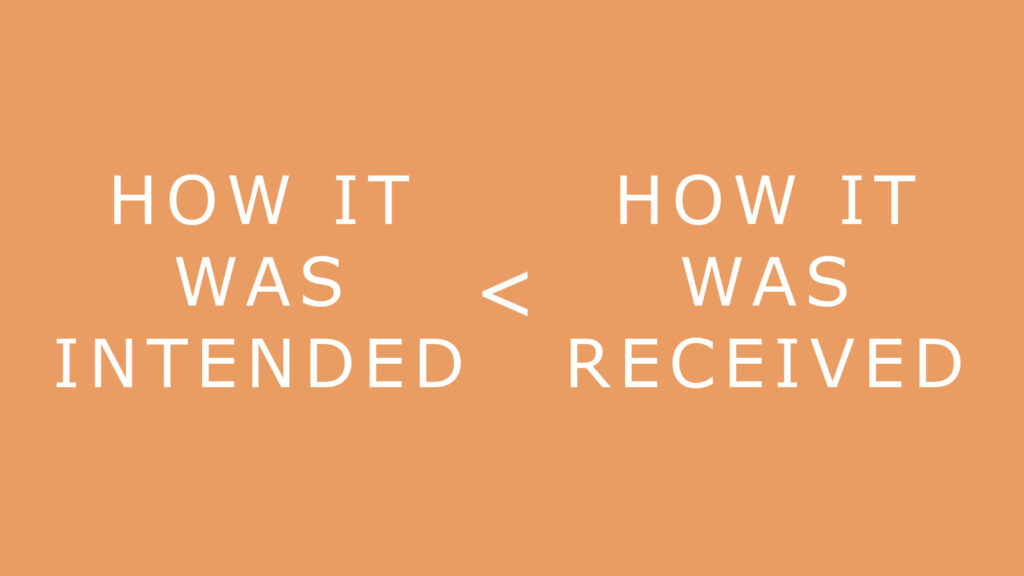Lately I’ve been thinking about intentions and how much it factors into emotional reception and relationships. Intent vs impact.
How, when someone tells us we unknowingly hurt them, we usually say:
“I’m sorry. That wasn’t my intention.”
“I didn’t mean it.”
“I am not -ist.”
We say this as if that would be enough. As if letting the other person know we have good intentions would be sufficient to explain where we stand. As if that eases the hurt we caused.
I’ve been on both ends of this Intention vs Reception / Intent vs Impact Spectrum. And it’s always something that I’m trying to gauge – when intentions count and when it doesn’t.
It wasn’t until I saw this one slide in a self-leadership workshop I joined last year that I found [a little bit] of clarity.

In short, your intent don’t matter.
At least not as much as the impact of your actions do.
See, when it comes to pain and hurt and relationships, we have been wired to associate both intent and impact deeply with each other. It is easier to be angry and throw blame at someone when you know they’ve intentionally hurt you. And it has been proven that intentional pain is far more damaging than unintentional pain – even when the degree of pain they inflict is objectively the same. In fact, it has been shown that people have a cognitive bias when they know a hurtful act is intentional. That is, people are more easily able to build a case against the offender when they know intent was present.
But without intent, that conviction of wrongdoing? That validation of pain? It becomes questioned.
When your feelings are doubted
How many times have you felt hurt by someone’s actions and when you confronted them about it, and they told you they didn’t mean any harm, you started to doubt your hurt?
Suddenly you wonder if your pain was reasonable enough. If it was sensible enough. Rational enough.
And when you think about that, it doesn’t make sense!
Because feelings do not dwell in the realm of reason. Nor sensibility. Nor rationality. Feelings are feelings. And the moment they exist, they are valid – point blank.
Over time, you start to… well, for lack of a more fitting word, “nurture” that doubt inside your head. And you start wondering if anything you’re feeling – both negative or positive – is even valid in the first place.
This happened to me just yesterday.
Someone shared a video in a group chat I’m in. The video itself was meant to be inspirational. But the context of sharing it in that particular group chat felt…unsettling. See, a lot of us on there openly expressed our frustrations on our current situation. A few have even decided to leave the group. I was one of those people. And the video that person shared? It was about how patience and loyalty and commitment meant success. And that quitting something “early on” is a sign of failure.
And I understand that it was perhaps a well-intentioned share – meant for those who are still hedging. But the first thing I felt was hurt. I felt offended. Like I was slapped in the face with a huge ice pack.
And then I asked myself if my hurt was justified.
JUSTIFIED, for fuck’s sake. No one should think like that!
But this is a carefully built mindset deeply rooted in our culture of “apologizing = weakness”. And I hate that I think this way. I hate that anyone thinks this way.
Pain first, apologize now
If there’s something I learned from that one weirdly combined Religious Ed / Fire Drill Response class in college, it’s that response teams must prioritize the wounded first before dealing with anything else. This same principle can also be applied to emotional pain.
Of course, no one ever has any control of other people’s feelings. You are not responsible for how another person reacts to what you do. But that does not mean your actions have no (hurtful) impact.
I keep remembering that one line from The Bright Sessions podcast, when Mark confronted Damien with the gaslighting and abuse he experienced:
[That] I’m telling you you hurt me. I’ve told you over and over. And I need you to understand that that’s real, no matter how much you try to ignore me or try to justify what you did. You hurt me and that isn’t something you get to control.
Mark Bryant, The Bright Sessions episode 48
(And yes, expect a post about this podcast in the near future.)
Redirecting the conversation from the hurt party to the offender’s intent is (highly likely) invalidating the hurt party’s feelings.
This is why it is so important to apologize sincerely – without any caveats. That it is important to show empathy when someone’s Feeling The Suck because of you.
To acknowledge that you’ve hurt someone and that you will do better.
And acknowledging the fact that you hurt someone doesn’t make you a bad person. I believe it’s quite the opposite. It means you are aware your actions have impact. You are aware that you have the potential to hurt others, just as much as others have the potential to hurt you.
Additional readings:
Here’s a really great essay compiling some insightful scientific research around intent vs impact and how both are deeply intertwined: Why it’s so hard to prioritize impacts over intents – Scientific American Blog
This one details not only what the offender can do but a gentle reminder for the hurt party: Understanding Intent vs Impact – She Geeks Out
These two articles emphasize the importance of apologies and which ones are genuine, effective apologies – and which ones are grade A douchebaggery:
Intent vs Impact: Why your intentions don’t really matter – Everyday Feminism
Impact vs Intent: Why we suck at apologies
Photo by Kaitlyn Baker on Unsplash

Leave a Reply